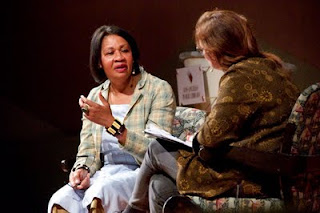Jamaica Kincaid: Writing for solace, for herself. By: Holmstrom, David, Christian Science Monitor, 08827729, 1/17/96, Vol. 88, Issue 35
JAMAICA KINCAID: WRITING FOR SOLACE, FOR HERSELF
Her work gives voice to the lone, struggling individual
Dateline: CAMBRIDGE, MASS.
Outside, freezing weather makes the air crack. Inside, with a cold gentleness, Jamaica Kincaid puts the recent Million Man March in the palm of her voice and squeezes.
"I find spectacles like that very disturbing and dismaying," she says, seated in a book-jumbled office here at Harvard University, where she teaches creative writing part-time.
"In America, it seems to me that people of African descent in particular are asked always to speak in group voices," she says, "and I'm not a group person, so it doesn't appeal to me. There is this terrible sense of group identity, but one really is a person. You just get out of bed every day with your own doubts and certainties, and they are your own."
Ms. Kincaid, born in Antigua in the West Indies, has arrived at a separate vantage point from most blacks to view the condition of black America. Like the protagonists in her celebrated novels, social context and politics are background noises. One struggling individual is the heart of the matter in her new novel, "The Autobiography of My Mother," as in her four previous novels.
"I am pleased to be black," Kincaid says. Her voice at times rings with Eleanor Roosevelt's high-pitched enthusiasm, spliced to Maya Angelou's precision. "I'm pleased about being black the way I have two eyes," she says. "I don't find particular pride in it. How can you be proud of something you can't help? If you don't like black people, don't like me. On the whole, I'm just myself."
When Kincaid arrived in the United States from Antigua in 1966 at the age of 17, she was Elaine Porter Richardson, a gangly young woman with a West Indian lilt to her voice and a job as an au pair. Luxuries like indoor plumbing were unknown to her.
In New York, Kincaid was fiercely curious and intellectually raw. She stumbled around the city for several years, completing high school and some college courses. Although treated cruelly as a child, she was conditioned not to bring shame on her family, particularly her mother.
"When I started to write, I was embarrassed that my family would know I was writing," she says of the first piece that the New Yorker magazine published. "There was no reason in the world for it to work out, so I changed my name because I didn't want them to laugh at me."
A writing career bloomed rapidly.
"I met wonderful people who were very kind to me," she says. Short stories about her West Indian life began appearing regularly in the New Yorker. Most reviewers of her books now bathe her regularly in the waters of praise for the "emotional truthfulness" and power of her writing.
What characterizes her works is a calm voice in trouble, an unsteady protagonist alternately bewildered and judgmental in her relationships -and always alone and intrigued by life's sharp corners.
"I am writing for solace," Kincaid says of her books. "I consider myself the reader I am writing for, and it is to make sense of something, even if to repeat to myself what has happened. Character and ideas are not separate from me. I don't like dialogue. I can't bear it. I do like reading it in other books, but I can't do it myself."
Asked if she thinks a troubled childhood forced her interior voice to engage in a dialogue with herself, just as in her writing, she answers with a laugh. "Oh gosh, that's interesting. You are probably right. Perhaps the only voice I hear is my own."
Married to a composer, Kincaid has two young children and lives in Bennington, Vt. Her childhood memories are bluntly shared.
"I was very badly treated as a child under the guise of love and attention," she comments. "But to be absolutely honest, it was not unusually so. I think people in that part of the world have humiliation and pain visited upon them to an incredible degree, and in turn they visit it on their children."
Her politics are unabashedly liberal. "I love liberals," she says. "I so miss William Kuntsler [an activist attorney who recently passed on]. He always seemed to be somewhere some misguided, lowly person had done some horrible thing.
"I don't think there is a failure of liberalism at all," she adds. "You can't get rid of poor people anymore than you can get rid of people."
PHOTO (COLOR): JAMAICA KINCAID: 'I consider myself the reader I am writing for, and it is to make sense of something, even if to repeat to myself what has happened.', ROBERT HARBISON - STAFF
~~~~~~~~
By David Holmstrom, Staff writer of The Christian Science Monitor
________________________________________





